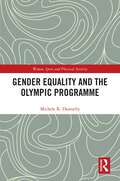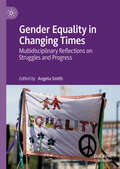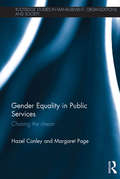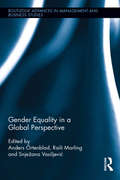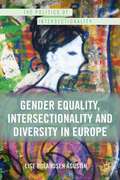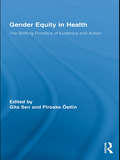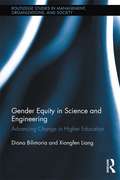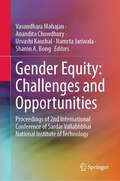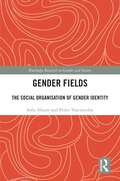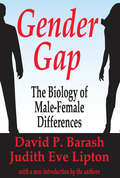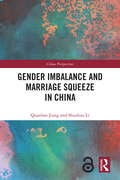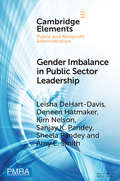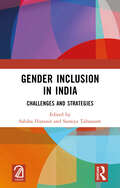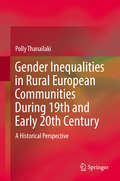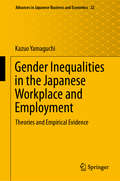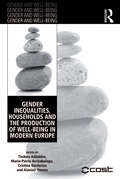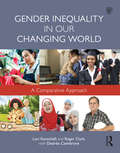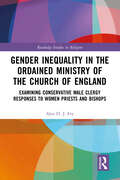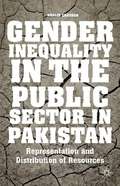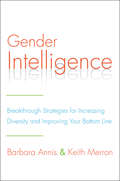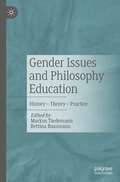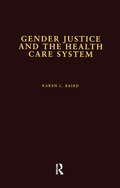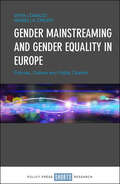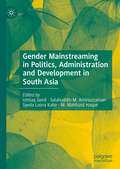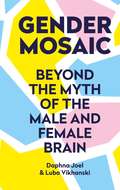- Table View
- List View
Gender Equality and the Olympic Programme (Women, Sport and Physical Activity)
by Michele K. DonnellyThis innovative study examines the Olympic programme from a critical feminist perspective, to shed new light on the issues of gender and inclusion at the Olympic Games and in the Olympic Movement. Incorporating both quantitative and qualitative data, the book identifies and analyzes the changes – and remaining gender differences – made on the Olympic Programmes for London 2012, and each of the subsequent Summer and Winter Olympic Games (Sochi 2014, Rio 2016, and Pyeongchang 2018), as well as the Tokyo 2020 and Beijing 2022 Games. The book draws on the IOC&’s own publications, information from International and National Sport Federations, and media sources to describe and explain the IOC&’s slow and uneven progress toward gender equality at the Olympic Games. This is important reading for any student, researcher, practitioner or policy maker with an interest in the Olympic Games, sport studies, gender studies, women&’s sport or major events.
Gender Equality in Changing Times: Multidisciplinary Reflections on Struggles and Progress
by Angela SmithThis edited collection explores issues of gender equality in the global context. Campaigns to achieve gender equality throughout the twentieth century brought about huge changes in westernised countries. In particular, the achievements of second-wave feminism with regards to gender and sexual equality benefit many people today. The famous 'seven demands' of the second-wave movement form the basis of the chapters of this book, probing the advances made legally, socially and culturally. Contributors to this collection acknowledge the advances brought about by the second-wave movement, but highlight the work which still needs to be done in the twenty-first century, including the changes in society that have resulted in shifts in masculinity. Gender Equality in Changing Times is divided into two parts, following an overview of theoretical debates and social contexts that lead us to the current period of gender and sexual relations. Part One looks at gender equality by exploring the 'experience' of being part of a group where gender boundaries still exist, drawing on auto-ethnographies of those in key groups that are central to this debate, as well as interviews with members of such groups. Part Two investigates wider representations of these groups, offering an insight into the geopolitical world of gender relations in Saudi Arabia and China. Ultimately, this collection shows how much has been achieved, yet how far is also left to go. Students and scholars across a range of disciplines, including gender studies, history, education, sociology, media studies, politics, business studies, cultural studies and English literature and linguistics, will find this book of interest.
Gender Equality in Public Services: Chasing the Dream (Routledge Studies in Management, Organizations and Society)
by Hazel Conley Margaret PageThe provision of state funded and democratically accountable care services represents one of the most potentially transformative advances in gendered social relations and equality for women by ‘defamilizing’ care and providing paid work. But the cost of providing these services, which women have access to them and how they should be provided are always at the forefront of debate, especially during economic crises. Socially funded and publicly accountable care services are therefore a key site of feminist activity, but also the frontline for spending cuts and 'reform' during times of austerity. Gender Equality in Public Services analyses how gender equality work in British public services is changing in response to factors including: equality legislation; the erosion of local democracy, privatisation of public services and new forms of feminist activism and leadership. It also assesses the challenges and opportunities for promoting women’s equality in producing and using public services.Impacting upon developed and developing economies, the arguments in this challenging book explore the potential of equality and feminist activism and leadership for radical and transformational change. It will appeal to advanced students, researchers and practitioners interested in social policy, feminist organization theory, equal opportunities and gender mainstreaming practice.
Gender Equality in a Global Perspective (Routledge Advances in Management and Business Studies #68)
by Anders Ortenblad Raili Marling Snjezana VasiljevicGender Equality in a Global Perspective looks to discuss whether Gender Equality can be adopted as it has been defined in international documents anywhere, or whether it needs to be adapted in a more local context; discuss which factors and perspectives need to be taken into account when adapting Gender Equality to specific contexts; suggest research approaches for studies on whether a universal (Western) concept of Gender Equality fits in certain specific contexts; and finally suggests challenges to the existing interpretation of Gender Equality (e.g., theory of intersectionality); and the development of legal and policy framework. This book is situated within the tradition of comparative gender studies. While most other such books take up and compare various ways of implementing (or not implementing) gender equality, this book studies and compares whether or not (and to what extent) a specific definition of Gender Equality (GE) could be adopted by various nations. Thus, all chapter contributors will engage with the same definition of GE, which will be presented within the book, and discuss the possibilities and constrains related to applying such a definition in their particular national context. The readers will learn about the problems of applying a universal concept of Gender Equality and the possible reasons for and modes of adapting Gender Equality to different contexts. Gender Equality in a Global Perspective looks to maintain a critical and reflexive stance towards the issues raised and will seek to present multiple perspectives and open-ended answers. As such it hopes to contribute to the international discussion of human rights more broadly and Gender Equality specifically. The intended audience is not limited only to but will include policy makers, scholars and students with an interest in Gender issues, Organizational Theory, Political Science, Human Development, Policy Analysis, Globalization and other management sub-disciplines.
Gender Equality, Intersectionality, and Diversity in Europe (The Politics of Intersectionality)
by Lise Rolandsen AgustínGender is being marginalized with the increased attention to "multiple discrimination" and civil society landscape at the transnational level is increasingly diversified. The book looks at the processes of (strategic) degendering in EU policy-making and on the interaction between EU institutions and European women's organizations.
Gender Equity in Health: The Shifting Frontiers of Evidence and Action (Routledge Studies in Health and Social Welfare)
by Gita Sen Piroska ÖstlinThis volume brings together experts from a variety of disciplines, such as medicine, biology, sociology, epidemiology, anthropology, economics and political science, who focus on three areas: health disparities and inequity due to gender, the specific problems women face in meeting the highest attainable standards of health, and the policies and actions that can address them. Highlighting the importance of intersecting social hierarchies (e.g. gender, class and ethnicity) for understanding health inequities and their implications for health policy, contributors detail and recommend policy approaches and agendas that incorporate, but go beyond commonly acknowledged issues relating to women’s health and gender equity in health.
Gender Equity in Science and Engineering: Advancing Change in Higher Education (Routledge Studies in Management, Organizations and Society)
by Diana Bilimoria Xiangfen LiangWomen faculty’s participation in academic science and engineering is critical for future US global competitiveness, yet their underrepresentation particularly in senior positions remains a widespread problem. To overcome persistent institutional resistance and barriers to change, the NSF ADVANCE institutional transformation initiative, instituted in 2001, seeks to increase the workforce participation of women faculty in academic science and engineering through systematic institutional transformation. This book assesses the equity, diversity and inclusion outcomes of the changes underway at 19 universities. It provides a comprehensive, stand-alone description of successful approaches to increase the recruitment, advancement and retention of women faculty throughout the academic career pipeline. The findings show that targeted institutional transformation at these 19 U.S. universities has resulted in significant increases in women faculty’s workforce participation, as well as improved gender equity and inclusion. Analyses by discipline show that the greatest changes have occurred within engineering and natural science disciplines at these universities. Yet the results also point to the overall continued underrepresentation of women faculty in academic science and engineering at the nation’s research universities. A framework of organizational change is derived to serve as a template to academic and other organizations seeking transformation to enhance gender equity, diversity and inclusion.
Gender Equity: Proceedings of 2nd International Conference of Sardar Vallabhbhai National Institute of Technology
by Sharon A. Bong Vasundhara Mahajan Anandita Chowdhury Urvashi Kaushal Namrta JariwalaThis book comprises the proceedings of the TEQIP III Sponsored 2nd International Conference on “Gender Equity: Challenges and Opportunities” (2nd ICOGECAO 2020 -Virtual Mode), held at Sardar Vallabhbhai National Institute of Technology, Surat, Gujarat, India, from 25 to 27 November 2020. ICOGECAO provided a platform for researchers from multiple countries to present their views about the challenges associated with gender equity. Gender equity is one of the seventeen Sustainable Development Goals (SDG 5) set up by the United Nations in 2015, to promote and empower all genders equally. The proceedings strongly support the ideas of gender neutrality and blow out the mind-set of limiting gender studies to only women rights. They offer a collection of articles that break the stereotypes and myths often wrongly associated with gender. The ideas in the presented papers highlight gender-based discriminations, ask important questions and share facts that encompass beyond the so-called boundary lines. The authors contributed on various topics including but not limited to violence, crime, discrimination, and abuse against women and LGBTQ+ community. The basic motive of the presented book is to incorporate ideas and contribute to the sensitization and education about the important yet often neglected issues of gender equality. Thus, this book proves to be an essential resource for educators and researchers working in the field of gender studies. The work presents challenges caused due to COVID-19, social media, popular culture and work–life balance and explores empowerment through law, skills, technology and media. Some interesting case studies highlighted gender discrimination in science, sports and law. A variety of papers on literary texts were examined from a gender lens. The proceeding is divided into five subsections: 1. law, 2. literature, 3. management, 4. sociology and 5. social studies. The proceeding provides a wider perceptive and visuals about the scenarios which needs attention. The ideas presented will be helpful for achieving the sustainable development goal of gender equity to a greater extent.
Gender Fields: The Social Organisation of Gender Identity (Routledge Research in Gender and Society)
by Sofia Aboim Pedro VasconcelosExploring gender through the lens of field theory, Gender Fields proposes a new framework for understanding the social organisation of gender identity. In conversation with Pierre Bourdieu's field theory, the book conceptualises under-theorised situated dimensions of gender, bridging the gap between macro and micro theories of gender. Drawing on extensive fieldwork conducted over five years in several countries in Europe and beyond, the authors situate gender as a critical site of autonomous socio-political struggle and highlight the centrality of the transgender experience in redefining gendered personhood and freedom. Increased trans visibility catalysed new social and political arenas of contestation that expanded the potential for reimagining gender norms and identities. The authors examine political and legal arenas, the medical field and health markets, gender naming, individual practices, and material-discursive embodiments, offering new insights into gender change. While numerous explanations have been proposed, this book offers a fresh perspective on these revolutionary developments. Gender Fields characterises gender as a field of struggle through a set of basic tools that can be usefully applied to studies in diverse settings. As such, it will appeal to scholars across the social sciences with an interest in issues of gender, social theory and identity.
Gender Gap: How Genes and Gender Influence Our Relationships
by David P. Barash Judith Eve LiptonLet's face it, say Barash and Lipton: Males and females, boys and girls, men and women are different. To be sure, these differences are often heightened by distinctions in learning, cultural tradition, and social expectation, but underpinning them all is a fundamental difference that derives from biology. Throughout the natural world, males are those creatures that make sperm; females make eggs. The oft-noticed "gender gap" derives, in turn, from this "gamete gap." In Gender Gap, Barash and Lipton (husband and wife, professor and physician, biologist and psychiatrist) explain the evolutionary aspects of male-female differences.
Gender Imbalance and Marriage Squeeze in China (ISSN)
by Shuzhuo Li Quanbao JiangThis book presents a comprehensive analysis of China’s imbalanced sex ratio at birth and marriage market, and the implications of these phenomena for population development and families.China’s persistently high sex ratio at birth (SRB) since the early 1980s has led to serious gender imbalance and male marriage squeeze. After examining the quality of existing data on SRB, the authors provide their estimates of the sex-selective abortion rate, describe the trends and geographical patterns in SRB, and disaggregate changes in SRB by birth order and province. Special attention is given to the number and proportion of missing girls between 1980 and 2010. Based on the quantitative analyses, the book projects the implications of the severe gender imbalance for China’s population development and the future dynamics of the marriage market, including trends in age at first marriage, the proportion of never-married, the age structure of surplus males, and the life cycle of bare branch families.The book will appeal to scholars and students of demography, sociology, and China studies, especially those interested in China’s population and contemporary society.
Gender Imbalance in Public Sector Leadership: The Glass Cliff in Public Service Careers (Elements in Public and Nonprofit Administration)
by Amy Smith Kim Nelson Sanjay K. Pandey Leisha DeHart-Davis Deneen Hatmaker Sheela PandeyWomen are still underrepresented as public-sector organizational leaders, despite comprising half of the United States public-sector workforce. To explore the factors driving gender imbalance, this Element employs a problem-driven approach to examine gender imbalance in local government management. We use multiple methods, inductive and deductive research, and different theoretical frames for exploring why so few women are city or county managers. Our interviews, resume analysis and secondary data analysis suggesting that women in local government management face a complex puzzle of gendered experiences, career paths and appointment circumstances that lend insights into gender imbalanced leadership in this domain.
Gender Inclusion in India: Challenges and Strategies
by Sabiha Hussain Suraiya TabassumThis book not only aims at highlighting existing inequalities between men and women, but also their efforts to overcome these challenges, especially so in women belonging to marginalized communities. It tries to explore systematic denial of rights to marginalized women—opportunities and resources that are normally and easily available to other members of a group, and which are fundamental to social, political integration and observance of human rights such as housing, employment, healthcare, civic engagement and democratic participation. The authors through their in-depth discussions and writings have tried to sketch Equal World as imagined by John Stuart Mill in the opening lines of The Subjugation of Women. This book is co-published with Aakar Books. Print edition not for sale in South Asia (India, Sri Lanka, Nepal, Bangladesh, Pakistan and Bhutan)
Gender Inequalities in Rural European Communities During 19th and Early 20th Century: A Historical Perspective
by Polly ThanailakiThis book provides an overview of women’s opportunities for schooling, their social activities, and the social biases they faced in rural communities in Greece, Italy and parts of the Balkans during the 19th and early 20th century. It examines such topics as female illiteracy, the efforts of women-protestant missionaries to expand knowledge through Protestantism, the prejudice against education for women, the socio-economic context, the roles women fulfilled, and the structure of the patriarchal family. The book approaches these issues from the perspective of pedagogy and social history. The fundamental questions discussed by the book are: How was female education viewed by the country folk? What was the role of women in the private and the public sphere? How did peasant women respond to the challenges of the ‘modern’ world? Were they free to express their feelings and ambitions? In what way? Were they happy?
Gender Inequalities in the Japanese Workplace and Employment: Theories and Empirical Evidence (Advances in Japanese Business and Economics #22)
by Kazuo YamaguchiThe in-depth analyses presented in this book have a dual focus: (1) Social mechanisms through which the gender wage gap, gender inequality in the attainment of managerial positions, and gender segregation of occupations are generated in Japan; and (2) Assessments of the effects of firms’ gender-egalitarian personnel policies and work–life balance promotion policies on the gender wage gap and the firms’ productivity. In addition, this work reviews and discusses various economic and sociological theories of gender inequality and gender discrimination and considers their consistencies and inconsistencies with the results of the analysis of Japanese data. Furthermore, the book critically reviews and discusses the historical development of the Japanese employment system by juxtaposing rational and cultural explanations. This book is an English translation by the author of a book he first published in Japanese in 2017. The original Japanese-language edition received two major book awards in Japan. One was The Nikkei Economic Book Culture Award, which is given every year by the Nikkei Newspaper Company and the Japan Economic Research Center to a few best books on economy and society. The other was The Showa University’s Women’s Culture Research Award, which is bestowed annually on a single book of research that promotes gender equality. Kazuo Yamaguchi is the Ralph Lewis Professor of Sociology at the University of Chicago.
Gender Inequalities, Households and the Production of Well-Being in Modern Europe (Gender and Well-Being)
by Tindara Addabbo Marie-Pierre Arrizabalaga Alastair OwensFeminist scholars have long pointed out the relevance of the unpaid work that goes on within European households in sustaining the well-being of the continent's populations. However, care work and domestic labour continue to be largely unremunerated and unequally distributed by gender. This unique volume of interdisciplinary essays casts new light on the roles that households play in securing the well-being of individuals and families, uncovering the processes of bargaining and accommodation, and conflict and compromise that underpin them. Contributors put gender at the centre of their analyses, demonstrating the uneven experiences of men and women as both providers and receivers of welfare in European households, in both the past and the present. As European states grapple with changing family forms, a growing population of dependent people, increased participation of women in labour markets and a profound shift in the nature and organisation of work, this book makes a timely contribution to our understanding of the critical role played by households in mediating processes of economic and social change. It offers new challenges to scholars, researchers and policy makers eager to address gender inequalities and enhance well-being. This book is the second of four volumes being published as part of Ashgate's 'Gender and Well-Being' series that arise from a programme of international symposia funded by the European Science Foundation under the auspices of COST (European Cooperation in the field of Scientific and Technical Research).
Gender Inequality in Our Changing World: A Comparative Approach
by Lori Kenschaft Roger Clark Desiree CiambroneGender Inequality in Our Changing World: A Comparative Approach focuses on the contemporary United States but places it in historical and global context. Written for sociology of gender courses, this textbook identifies conditions that encourage greater or lesser gender inequality, explains how gender and gender inequality change over time, and explores how gender intersects with other hierarchies, especially those related to race, social class, and sexual identity. The authors integrate historical and international materials as they help students think both theoretically and empirically about the causes and consequences of gender inequality, both in their own lives and in the lives of others worldwide.
Gender Inequality in the Ordained Ministry of the Church of England: Examining Conservative Male Clergy Responses to Women Priests and Bishops (Routledge Studies in Religion)
by Alex D.J. FryThis book offers a fresh social scientific analysis of how theologically conservative male clergy respond to the ordination of women to the priesthood and their consecration as bishops within the Church of England. The question of women’s place in the formal structures of England’s Established Church remains contested. For many, to prevent women from occupying such offices is often understood to be a matter of inequality, whereas those who oppose their ordination see it as a matter of obedience to God’s will. Tensions have become heightened in a culture that increasingly promotes the rights of individuals who have historically been marginalised and that challenges traditional social roles. This volume explores the gender attitudes held by clergy in the Anglo-Catholic and evangelical traditions of the Church and considers how these gender attitudes shape the way they think about women’s ordination and how they interact with female colleagues. It also considers the contribution of a range of social phenomena to the formation of these gender attitudes. The author draws on and develops a variety of sociological and psychological theories that help to explain the processes that lead to the formation of clergy attitudes towards gender more broadly.
Gender Inequality in the Public Sector in Pakistan
by Khalid ChauhanAs gender training is applied increasingly as a development solution to gender inequality, this book examines gender inequality in Pakistan's public sector and questions whether a singular focus on gender training is enough to achieve progress in a patriarchal institutional context.
Gender Intelligence
by Keith Merron Barbara AnnisWorld-renowned experts on Gender Intelligence argue that it is time to move beyond politics and fairness to build an economic business case for gender diversity in the workplace.For too long, companies have played the numbers game--attempting to tackle the problem of gender imbalance through affirmative action, numeric standards, and quotas. Yet these efforts have had no measurable impact on the number of women in leadership or on a company's bottom line. Meanwhile, the dominant paradigm of traditional business remains the same.In Gender Intelligence, Barbara Annis and Keith Merron introduce a revolutionary and effective approach that is fundamentally altering the cultures of major corporations around the world. They uncover the forces that create the current condition of gender inequality and reveal, for the first time, the powerful principles that are bringing about a shift in thinking. They highlight organizations that have made the transformation from a focus on gender equity to the more powerful objective of welcoming the natural differences between men and women, which ultimately produces greater economic value. Gender Intelligence proves that the true measure of gender equality does not reside in a percentage but in the untapped power of men and women openly working and winning together.
Gender Issues and Philosophy Education: History – Theory – Practice
by Markus Tiedemann Bettina BussmannWith this volume a gap in the philosophical didactics is closed. A historical section initially introduces authors who have determined the gender discourse and at the same time a critical discussion. This is followed by an overview of sexual and gender diversity, its basics and differentiations. Theoretical papers then deal with the relevance of gender research for the self-understanding of philosophical education. Finally, practice-specific contributions demonstrate how topics and aspects of the gender problem can be prepared for different age groups and school types. With 2 lesson plans.
Gender Justice and the Health Care System (Health Care Policy in the United States)
by Karen L. BairdThis book focuses on gender justice and the health care system. It will be divided into two parts. In Part One, a framework of gender justice will be developed. What is gender justice? What would a gender just public policy look like? What criteria should such policies meet? In Part Two, the framework will be applied to the area of health care policy, specifically medical research and health care financing and delivery. An analysis of past policies will be made, as well as an analysis of the recently enacted and proposed changes. First published in 1998. Routledge is an imprint of Taylor & Francis, an informa company.
Gender Mainstreaming and Gender Equality in Europe: Policies, Culture and Public Opinion
by Isabella Crespi Vera LomazziWith gender equality so prominent in public debate, this timely book reviews the impacts of gender mainstreaming on political, social and cultural issues around Europe. It explores the origins and evolution of mainstreaming, the theory’s contribution to gender legislation so far and its potential to drive change in the future. Drawing on extensive data, the book compares and contrasts progress in various European countries and considers the limits of gender mainstreaming amid economic and migration challenges. This important book is a welcome contribution to discussions about society’s attitudes to men and women.
Gender Mainstreaming in Politics, Administration and Development in South Asia
by Ishtiaq Jamil Salahuddin M. Aminuzzaman Syeda Lasna Kabir M. Mahfuzul HaqueThis book explores and analyzes gender mainstreaming in South Asia. Gender mainstreaming as a concept is about removing disparities between men and women – about equal access to resources, inclusion and participation in the public sphere, representation in government, and empowerment, all with the aim of achieving equal opportunities for men and women in family life, society, administration, politics, and the economy. The challenges of gender mainstreaming in South Asia are huge, especially in the contexts of patriarchal, religious, and caste-based social norms and values. Men’s dominance in politics, administration, and economic activities is distinctly visible. Women have been subservient to the policy preferences of their male counterparts. However, in recent years, more women are participating in politics at the local and national levels, in administration, and in formal economic activities. Have gender equality and equity been ensured in South Asia? This book focuses on how gender-related issues are incorporated into policy formulation and governance, how they have fared, what challenges they have encountered when these policies were put into practice, and their implications and fate in the context of five South Asian countries. The authors have used varied frameworks to analyze gender mainstreaming at the micro and macro levels. Written from public administration and political science perspectives, the book provides an overview of the possibilities and constraints of gender mainstreaming in a region, which is not only diverse in ethnicity and religion, but also in economic progress, political culture, and the state of governance.
Gender Mosaic: Beyond the myth of the male and female brain
by Luba Vikhanski Prof. Daphna JoelThis timely manifesto calls for a future free from gender-based assumptions about human potential. Written by the internationally renowned neuroscientist whose game-changing research debunks the myth of male and female brains.For generations we've been taught that women and men differ in profound ways. Women are supposedly more sensitive and cooperative, whereas men are more aggressive and sexual because this or that region in the brains of women is larger or smaller than in the brains of men, or because they have more or less of this or that hormone. This story seems to provide us with a neat biological explanation for much of what we encounter in day-to-day life. It's even sometimes used to explain why, for example, most teachers are women and most engineers are men. But is it true? Using the ground-breaking results from her own lab and from other recent studies, neuroscientist Daphna Joel shows that it is not. Instead, argues Joel, every brain - and every human being - is a mosaic, or mixture, of 'female' and 'male' characteristics. With urgent practical implications for the world around us, this is a fascinating look at gender - how it works, its history and its future - and a sorely needed investigation into the false basis of our most fundamental beliefs. Perfect for readers of Mary Beard's Women & Power, Cordelia Fine's Testosterone Rex, Chimamanda Ngozi Adichie's We Should All Be Feminists and Gina Rippon's The Gendered Brain. 'Brilliantly accessible. Gender Mosaic takes you on a fascinating scientific journey that will transform how you think about sex, gender and the brain.' Cordelia Fine, author of Testosterone Rex'A power-packed manifesto that envisions what our world might look like if we let go of tired gender stereotypes.' - Sarah Richardson, author of Sex Itself 'Gender Mosaic is the book I've been waiting for! Enlightening, funny and never dogmatic, Joel plumbs the science, offering great insights into how moving beyond that stale story of the male and female brain could improve medicine, education, careers and relationships.' - Rebecca Jordan-Young, author of Brain Storm'Joel and Vikhanski offer a fascinating glimpse of what's possible when we liberate ourselves from the myth of pink and blue brains.' - Lise Eliot PhD, Professor of Neuroscience, Rosalind Franklin University of Medicine and Science'This is a fantastic book. It is one of the best books about sex, gender, biology, and the brain - and the social implications of these issues - that I have ever read. The writing is clear, captivating, and concise - and the content is groundbreaking. This is a visionary and brave book.' - Rebecca S. Bigler, Professor Emeritx of Psychology, University of Texas at Austin
